The race to 2 nanometers (nm) is no longer just a matter of engineering but also geopolitics and business strategy. Taiwan Semiconductor Manufacturing Company (TSMC), the world’s largest contract chipmaker, has decided to exclude Chinese-origin equipment from its most advanced production lines, according to reports from Digitimes and Nikkei Asia.
The decision comes at a pivotal moment, as the U.S. pushes forward with the Chip EQUIP Act, a legislative proposal aiming to ban companies that benefit from federal subsidies from using tools from “foreign entities of concern,” which includes Chinese manufacturers like AMEC and Mattson Technology.
A historic leap toward 2 nm
The 2 nm process, known as N2, represents a paradigm shift in the industry. It will be TSMC’s first technology to incorporate Gate-All-Around (GAA) transistors, the most significant structural change since the introduction of FinFETs over a decade ago.
The company anticipates this transition will deliver a performance improvement of 10-15% and a power reduction of 25-30%, both crucial gains to meet the demands of giants like Apple, Nvidia, and Qualcomm in the era of artificial intelligence.
With so much at stake, choosing suppliers is no longer purely a technical decision. Ensuring the supply chain is free from potential U.S. sanctions has become a strategic priority.
Washington as an unseen arbiter
TSMC has decided to certify only Japanese, American, and European equipment in its factories in Hsinchu and Kaohsiung (Taiwan), as well as in its upcoming plant in Arizona (U.S.).
The message is clear: the company aims to secure its access to U.S. incentives, which are critical to its global expansion. Simultaneously, it signals trust to its key Silicon Valley clients, worried that politicization could delay delivery schedules.
Auditing local suppliers
Beyond China, Digitimes reports that TSMC is thoroughly reviewing its Taiwanese equipment and material suppliers. The criteria go beyond geopolitical security to include profitability considerations.
The company might exclude suppliers with gross margins exceeding 58%, which is TSMC’s own margin, or those with high exposure to the Chinese market. Some firms may have already lost orders slated for their inclusion in the approved suppliers list by 2026.
This suggests TSMC is leveraging this period to reorganize its supply chain, aligning it both with U.S. requirements and its internal goals of cost control and risk reduction.
Risks of the strategy
While this approach strengthens TSMC’s position in Washington and with Western customers, it also carries potential side effects:
- Taiwanese suppliers excluded might turn even more toward the Chinese market, reinforcing the bloc that Taipei and the U.S. seek to avoid.
- The reliance on a small number of “acceptable” suppliers could limit TSMC’s flexibility in the face of global disruptions.
- Politicizing the tech supply chain deepens the divide between two semiconductor ecosystems: one led by the U.S., Japan, and Europe, and another centered around China.
The near-term future
TSMC’s “decoupling” from China does not mean the company will cease doing business there but rather that it is making a strategic separation at its most advanced nodes. In mature nodes (28 nm and above), China’s role will remain significant. However, at the frontier of 2 nm and beyond, the company aims to ensure that no client—much less a government—can challenge the integrity of its supply chain.
The conclusion is that the race to 2 nm is being shaped by both transistor physics and global geopolitics and economics. Chips will become faster and more efficient, but manufactured within a shrinking, politically aligned ecosystem.
Frequently Asked Questions (FAQ)
1. Why has TSMC stopped using Chinese tools at 2 nm?
To avoid U.S. sanctions, secure access to federal subsidies, and maintain the trust of Western clients like Apple and Nvidia.
2. What does the leap to 2 nm technology entail?
It introduces Gate-All-Around (GAA) transistors, with improvements of 10-15% in performance and 25-30% reductions in energy consumption.
3. How does this decision impact local Taiwanese suppliers?
TSMC is auditing its suppliers and may exclude those overly dependent on China or with high margins, reorganizing its entire supply chain.
4. What will be the impact on the global chip industry?
It deepens the separation between the Western semiconductor ecosystem (U.S., Japan, Europe) and China, accelerating the global technological decoupling.

